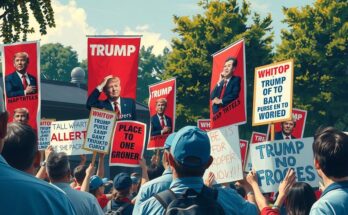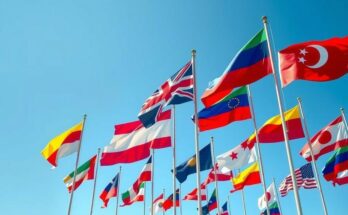Tunisia’s upcoming presidential election on 6 October contrasts sharply with previous campaigns, as President Kais Saied’s regime has suppressed political dissent and eliminated opposition candidates. Saied’s consolidation of power following his 2021 coup has led to public disillusionment, culminating in an election deemed lacking in legitimacy. Many Tunisians oppose Saied’s authoritarian approach, reflecting a desire to restore democratic processes and institutions.
In the lead-up to Tunisia’s presidential election on 6 October, one would be hard-pressed to detect the customary enthusiastic atmosphere that previously accompanied such events. Unlike the invigorating campaigns of 2011 to 2019, where numerous candidates vied for public favor through vibrant rallies and media engagements, the current entrenchment of President Kais Saied has rendered the electoral landscape starkly subdued. Saied, whose ascension to power in 2019 was marked by a significant voter mandate—achieving 72.7% in the runoff—has systematically dismantled the democratic institutions that facilitated his rise, rendering the forthcoming election a mere shadow of its predecessors. Since instigating a coup on 25 July 2021 that curtailed democratic processes in Tunisia, there has been a notable decline in Saied’s popularity, as public aspirations for revolutionary change have given way to disillusionment. His governance, characterized by the imprisonment of opponents and the silencing of dissent through harsh media crackdowns, starkly contrasts with the democratic ideals he once espoused. Currently, Tunisians find themselves unable to participate in live presidential debates—a practice that was once a hallmark of political discourse in the region. Furthermore, ongoing geopolitical issues, such as the humanitarian crisis in Gaza, have unveiled a stark disparity between Saied’s promises and the realities faced by the electorate. As electoral day looms, the environment is characterized by fear, underlined by the arbitrary arrest of opposition figures, including Ayachi Zammel, the leading candidate, who has faced imprisonment throughout much of the campaign. The circumstances surrounding this election further illustrate Saied’s intolerance for political rivalry; despite numerous challengers attempting to navigate the burdensome candidacy requirements, many have been effectively eliminated from contention by a biased judicial and electoral framework. The absence of traditional election oversight mechanisms, heightened restrictions on political expression, and the recent history of disqualifications based on dubious criteria have culminated in widespread skepticism regarding the legitimacy of the electoral process. Protests have erupted within the capital in response to these alarming trends, reflecting a growing discontent among citizens who feel their democratic rights are being systematically eroded. Amid these tensions, the election is perceived by many as a tactic for Saied to consolidate his authority further. However, the resilience of his opposition, manifesting in diverse protests and renewed calls for restoration of unity within democratic civil society, suggests that the populace is determined to deconstruct the authoritarian regime and advocate for substantive political reform.
The backdrop of this analysis is rooted in the turbulent political landscape of Tunisia, which has undergone significant shifts since the Arab Spring of 2011. The initial promise of democracy and reforms has declined, especially following President Kais Saied’s unilateral actions in 2021 to dissolve parliamentary power and amend the constitution. His governance style has led to increased authoritarian practices, characterized by the suppression of opposition voices and the criminalization of dissent. Against this backdrop, the upcoming election is fraught with implications for the future of Tunisia’s political landscape.
In conclusion, the impending presidential election is emblematic of a broader struggle between authoritarianism and democratic aspirations in Tunisia. As President Saied seeks to solidify his power through a manipulated electoral process, the growing opposition and collective public dissent signal a critical juncture for the nation. The prospects for a legitimate electoral outcome appear dim, yet the mobilization among citizens offers a glimmer of hope for reestablishing Tunisia’s democratic frameworks and adhering to the principles for which many fought during the revolution.
Original Source: www.middleeasteye.net




